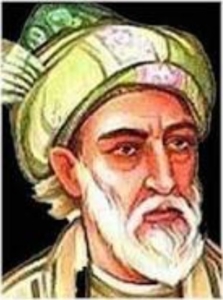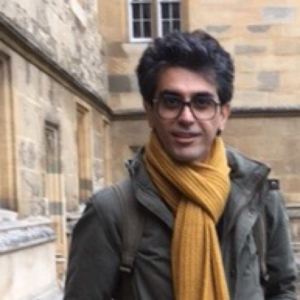Two Poems by Saeb Tabrizi
I hear God’s promise of forgiveness in the babbling wine.
From the rubab, I hear the clang of Paradise’s gate.
This is the difference when we hear:
you hear the door closing, I hear it opening.
Why not lie, like a rug, at the threshold of the tavern?
I hear hearts throb there beneath the dust.
The rose-colored wine running through my winding veins
sounds to me more lucid than the stream’s burbling.
I see lucidly the veiled phantoms.
I hear the gazelle’s footfalls in my dreams.
Everything I see unveiled sings
a song that dyes the gallows’ rope.
I hear Gabriel, archangel of love, fluttering
every moment in the cracks of my restless heart.
Moonlight smells like jasmine.
Has it kissed my beloved’s cheeks?
Your garments smell like smoke.
Have you been at the feast of the heated hearts?
Such raw words, Saeb, come from such dark hearts:
the ones who feel protected by that sun.
هوالغفور ز جوش شراب میشنوم
باب بهشت از رباب میشنوم
است میان شنیدن من و تو
بستن در و من فتح باب میشنوم
آستان خرابات چون نباشم فرش؟
بوی زندهدلی زان تراب میشنوم
می گلرنگ را به کوچه رگ
صد رسایی آواز آب میشنوم
پردگیان خیال میبینم
ی پای غزالان خواب میشنوم
که سر دار از آن شود رنگین
هر چه مینگرم بیحجاب میشنوم
شهپر جبریل عشق هر ساعت
رخنه دل پر اضطراب میشنوم
ز سیر بناگوش یار میآید؟
بوی یاسمن از ماهتاب میشنوم.
ز صحبت دلهای گرم میآیی
از لباس تو بوی کباب میشنوم
حرفهای خنک صائب از سیاهدلان
پشتگرمی آن آفتاب میشنوم
Just as thorns remain when the roses disappear,
nothing remains from youth but regret.
Sighs of remorse, hot tears, and only scars of loss
remain from the light steps of our lives.
Long tremulous threads of hope like the spider’s
remain from us on our doors and walls.
Pleasure begets pain in the end. The flower picker
finds only thorns in his hands from all the garden.
Relief has itchy feet: From all the flowers
there remains a tingling in the heart.
Our clays bodies cannot stand the fleet-footed life;
what wall could survive such a flood?
Ignorant is the one who traces the life gone.
It’s fleet footed––leaves only a vanishing trace.
We’re like the mountain-carver: our efforts yield nothing.
His time is blessed––he who leaves a work.
Only bells of regret remain in master’s hand
no matter of his wealth at the hour when he departs.
Barren souls do not profit from our deeds.
Only words remain from us, as from this pen.
The oppressor enjoys more chance than the oppressed
More snakes survive than ants in this world.
Tarnished hearts are not welcome in taverns.
Rust remains there where polishers are gone.
Love is such a strong wine, breaks the cup’s silence;
Lovers’ hearts are too tender to keep their secrets.
Shirin’s pleasure is tinged with hundreds of salty eyes.
Saeb is a tree––leaves more leaves than fruits.
کز رفتن گل خار میماند بجا
جوانی حسرت بسیار میماند بجا
افسوس و سرشک گرم و داغ حسرت است
از عمر سبکرفتار میماند بجا
غیر از رشته طول امل چون عنکبوت
از ما بر در و دیوار میماند بجا
غیر ناکامی ندارد حاصلی
کف گلچین ز گلشن خار میماند بجا
و بوی عافیت پا در رکاب رحلت است
در دل از گلزار میماند بجا
خاکی مانع عمر سبکرفتار نیست
این سیلاب کی دیوار میماند بجا؟
است آن کز حیات رفته میجوید اثر
پا کی زان سبکرفتار میماند بجا
کار از سعی ما چون کوهکن صورت نبست
آن کس خوش کزو آثار میماند بجا
افسوسی به دست خواجه هنگام رحیل
شمار درهم و دینار میماند بجا
از کردار ما بیحاصلان را بهرهای
قلم از ما همین گفتار میماند بجا
را مهلت از مظلوم چرخ افزون دهد
از مور اینجا مار میماند بجا
ناصاف در میخانه نتوان یافتن
هر جا صیقلی زنگار میماند بجا
حرف از لب ساغر می پرزور عشق
دل عاشق کجا اسرار میماند بجا
شیرین را بود در چاشنی صد چشم شور
صائب بیشتر از بار میماند بجا
Mirza Mohammad ʿAli Saʾeb Tabrizi (1592-1676) was one of the most accomplished Persian poets of the 16th century. As the poet laureate of the Safavid court, he spent seven years of his life in voluntary exile at the Mughal courts of India. He was one of the most prolific composers of the ghazal, or Persian lyrical/amatory poetry, with around seventy thousand extant lines of poetry. He is also known as a distinguished poet of classical Persian poetry’s Indian style, which is characterised by elaborate conceits and labyrinthine poetic images.
Rebecca Ruth Gould is the author of the poetry collection Cityscapes (2019) and the award-winning monograph Writers & Rebels (2016). She has translated many books from Persian and Georgian, including After Tomorrow the Days Disappear (2016) and, with Kayvan Tahmasebian, High Tide of the Eyes (2019). In addition, she was a Pushcart Prize nominee and was awarded the Creative Writing New Zealand Flash Fiction Competition prize in 2019. Check out her website here.
Kayvan Tahmasebian is a poet, translator, literary critic, and the author of Isfahan’s Mold (2016) and Lecture on Fear and Other Poems (2019). His poetry was a finalist for The Gabo Prize for Literature in Translation & Multilingual Texts in 2017. With Rebecca Ruth Gould, he is a co-translator of High Tide of the Eyes: Poems by Bijan Elahi (The Operating System, 2019). Learn more about him here.







